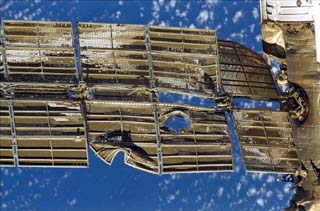


In his Oral History, U.S. Mir astronaut Michael Foale talks about the collision with the unmanned Progress supply vehicle.
"The collision demarcates everything for my flight," he says, "not because of the terribleness of the collision; [but] because it changed the whole condition of the station and the environment in which we worked..."
In the moments after the collision, Foale says, "One of the early thoughts that went through my brain [was] 'You know, I've been here six weeks and I think we're going to be going home right now.' I was actually kind of sad. I thought, 'Well, you know, that's a shame. I won't finish this whole thing. I had set out here to be four and a half months, and now it's going to get cut short. This is a real emergency.' And we had all the danger of getting out of there, but it was crossing my mind, 'This is a shame. I've only been here six and a half weeks. What a shame I'm not getting to do the whole thing.'
"Then it occurred to me, 'Well, you know, you'll get to see your kids and [your wife] Rhonda sooner.' And I thought, 'Oh, but we're going to be landing in Kazakhstan. That's going to be a delay.' ... It was exactly like that. [Then] I thought, 'You'd better focus on getting this sealed off here.' That's what went through my mind.
"Then we started pulling the cables, and I got serious, pulling the cables with Sasha [Aleksandr Lazutkin]. ... [When] we thought the way was clear from Spektr, we then tried to position this big, big hatch into it, [but the hatch] that we wanted to put in there ... was really tied up pretty severely. ... So we wasted about a minute trying to untie that hatch. And the pressure's falling, pressure's falling, so it's getting pretty frantic.
"I was worried that Vasily [Tsibliev] was not particularly ready -- he was now talking to the ground, but there was no obvious movement to evacuate yet. So I was thinking, 'Things are getting pretty tense now.'"
Foale and Lazutkin began working on isolating and closing off the Spektr module. Foale says, "So we wasted some time on this one big hatch. ... [but] it was too tied off. ... [So] we found a thin one, and that was pretty easy to untie. Sasha gave it to me [and I] popped it in place, and he says, 'Mike, hold it while I go and find the key to crank the latches that hold it closed.'
"In fact, the key was present in all this space, but with all the wires, cables, and hatches, ... we didn't see it. So he went off to another part of the station to go and get a key [while I held the hatch]."
Foale says that when air pressure pulled the hatch more tightly into place, he thought, "'Truly there is a leak on the other side of this,'" and he knew they had isolated the leak in the Spektr module. He continues, "I could feel the hatch holding in and then the pressure stopped dropping in my ears. So I thought, 'Hmm. I guess I'm not going home.'"
Foale relates that he " wasn't particularly pleased."
He confides, "in just the five minutes [right after the collision], I was getting excited about going home. Then I thought, 'Well, okay. We're here for the long haul.'
"It's a whole matter of adaptation, and I guess that's the way my psychology works. In the space of five or ten minutes after an emergency, I will already be trying to make something positive out of what that situation has dealt me. As soon as the tables turn around, I'll try and turn the tables one more time and make something positive out of what's happening. So then I thought, 'Well, hey! We just survived a pretty big emergency!'"
But, as Foale soon realized, the crew on Mir wasn't "out of the woods," yet.
Foale says, "Then all hell started to break loose... Stuff that I hadn't any clue of started to happen... I had no idea how fragile the Mir guidance and control complex is....
"The Mir, having been hit by the Progress, set into a bit of a spin, and ... the solar arrays weren't getting any energy ... and the batteries went flat pretty fast, and we went into a very severe power-down. [It was] so severe that in the night pass there was nothing [i.e., no systems] alive.
"As we were on the dark side of the orbit, there was nothing on. This lasted for about thirty hours, I think. Yes, a day and a half, ... [except] when we came into sunlight occasionally [and] get enough power on to a solar array that happened to be catching the sunlight at that moment... [Only then,] would we have enough power to talk to the ground and then try and recover."
In an aside in his Oral History, Foale says, "Believe it or not, our International Space Station, the American Space Station, is far, far worse [regarding difficulty of guidance and control]." Foale says he is now applying his Mir experience to help improve the ISS.
Related
Links:
The
Collision
Foale
on the "Spin"
Foale Increment
Profile: Michael Foale
Michael Foale Oral History (PDF)
![]()
|
|
Curator:
Kim Dismukes
Responsible NASA Official: John Ira Petty |
.gif)